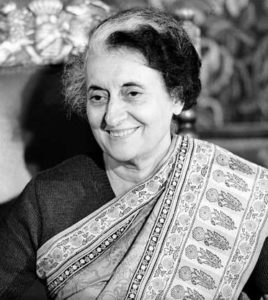Lecture Date: February 22, 2022
The Yuh Prosthodontics Lecture

One of first female Prime Ministers in the world and the first and only in India, Indira Gandhi was born in 1917 to a prominent political family at the height of India’s nationalist movement for freedom from British colonial rule. She spent a lonely childhood as her father, Jawaharlal Nehru, noted nationalist leader and later, independent India’s first Prime Minister, was mostly away from home and often incarcerated by the British colonial administration and her mother, Kamala Nehru, was in poor health. Gandhi was educated in private schools in India and Switzerland and eventually, went to college in Oxford. She was unable to complete college on account of the second World War and her own ill health, returning to India in 1941. She married Feroze Gandhi, a politician and journalist, on her return to India.
Indira Gandhi’s political career started at thirteen in the youth wing of the Indian National Congress, picketing against the British during India’s largely nonviolent freedom movement. After a hiatus during which she traveled to Europe on account of her mother’s need for treatment and for her own higher education, she resumed her political work on her return to India. Her involvement with politics got deeper as her marriage began to fail and she became her father’s confidant, advisor, and de facto hostess at his prime ministerial residence. Her political profile rose as she became the President of the Indian National Congress in 1959. However, her reputation remained one of a “dumb doll”, revealing little of the shrewd, decisive, aggressive and somewhat dictatorial leader she would eventually become.
Her rise to the post of the Prime Minister of India in 1966 reflects the challenges women faced in ascending to leadership positions in politics and elsewhere. Once in power, Gandhi transformed Indian politics and the Indian state itself. India’s decisive victory against Pakistan in 1971 and its “peaceful nuclear explosion” in 1973 reset India’s reputation as a dominant power in the region. India became self-sufficient in food production under her watch. Her economic policies transformed the industrial landscape, turning the Indian economy more inward-looking. Her eventual declaration of political “emergency” signaled the only period of formal suspension of democratic norms in independent India. She faced electoral defeat, imprisonment and rose from those ashes to become Prime Minister again in 1980. Finally, her disastrous response to a separatist movement in India’s northern state of Punjab cost her her life when her personal bodyguards assassinated her in 1984.
Speaker: Surupa Gupta

Surupa Gupta, Professor of Political Science and International Affairs at the University of Mary Washington, Fredericksburg, Virginia, earned a Ph.D. in International Relations from the University of Southern California and a Masters in International Relations and Bachelors in Economics from Jadavpur University, Kolkata, India.
Professor Gupta’s research focuses on India’s foreign and domestic economic policies. She has written on the domestic politics of trade and agriculture in India as well as India’s engagement with international economic institutions such as the World Trade Organization and the International Monetary Fund. She is the author of The Political Economy of Agricultural Policy Reform in India (with Regina Birner and Neeru Sharma). Her research has been published in both scholarly journals such as International Negotiations, International Studies Perspectives and outlets such as the Foreign Affairs and Foreign Policy blogs. She was a 2015-2016 Asia Studies Fellow at the East-West Center in Washington D.C. At UMW, Professor Gupta chairs the Women’s, Gender, and Sexuality Studies Program.